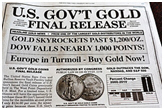 Financial spread betting combines both financial trading and betting, giving an easy to use way to profit from the stock and other financial markets. It is easy to understand, can multiply the value of your bet, and perhaps best of all, because it is betting you don’t pay capital gains tax on your winnings.
Financial spread betting combines both financial trading and betting, giving an easy to use way to profit from the stock and other financial markets. It is easy to understand, can multiply the value of your bet, and perhaps best of all, because it is betting you don’t pay capital gains tax on your winnings.
The Trader’s Toolkit
Understanding spread betting is critical to any trader’s ability to diversify and protect their assets.
When you place a financial spread bet, you are betting on the value of something going up or down. That something may be a share price, a stock market index, a commodity value, or even a currency exchange rate – financial spread betting is available on many different markets. Unlike buying stocks, it is as easy for you to profit from the value going down as up when you use financial spread betting.
You do not pay a commission to your spread betting provider. The provider profits from the amount of the “spread”. The spread is the difference between the price quoted when you’re betting that the value will go up, and the price quoted for a bet that the value will go down. An example will make this clear.
Suppose you want to place a bet on the London stock market index, the FTSE 100. Your broker will quote you two prices, perhaps 5545 – 5549 for this bet. The difference between these, in this case 4, is the spread. If you think the FTSE is going up, then you would “Buy” at 5549.
At this point, you’ll place your bet. Your spread betting provider will have a minimum size of bet, perhaps £1 per point. Say you decide to bet £5 per point. For a typical spread bet, you will win or lose by how much the index has changed by the end of the day, although you can pick different periods for your bet, such as the end of the month.
Suppose you are right and the index increases to a quote of 5586 — 5590 by the end of the day. Your bet would close at 5586, the “Sell” price, and as you can see this is where the spread gives the broker a profit. You have gained 37 points, up from 5549 to 5586, so your bet of £5 per point is worth £185.
In just the same way, if you felt the index was going down you would have sold at 5545 to place your bet. In this case you were wrong, so if you waited to the end of the day you would be down 45 points, 5545 minus 5590, and lose £225 if your bet was the same amount.
To place a bet, your spread betting provider will want some money, called the ‘margin’, in your account and the exact amount depends on what your bet is on and how the broker views the risk. It is easy to make large profits or losses, as you can see. To avoid a big loss you will usually place a “stop loss” order when you place the bet, and this tells your broker to take you out of the bet before your losses get too large, if the market goes the wrong way.
++++++++++++++++++++++++++++++++++++++++++++++++++++++++